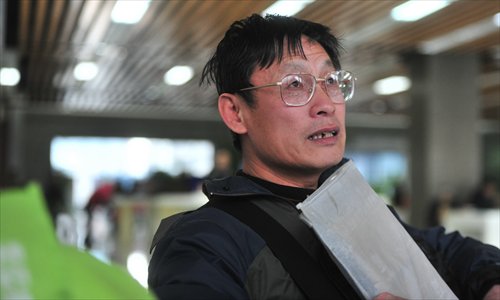After recent discovery ‘predicted’ by amateur, demands spread online for scientist to apologize

Guo Yingsen answers questions during an interview in Beijing on Sunday. Photo: CFP
"I've done better than Albert Einstein," a science enthusiast, who has recently been the focus of the online debate over so-called "folk science," was quoted by Shenyang-based Chinese Business Morning News as saying Monday.
Guo Yingsen, a retiree with a middle school education, came under fire from Fang Zhouzi, a famous science writer known for his efforts in exposing academic fraud, during an episode of the popular Only You TV show in 2011, in which Guo talked of the existence of gravitational waves - which at the time were purely theoretical - and argued that life can be prolonged without limit.
"Einstein is the scientist I admire the most," Guo told the Global Times on Wednesday, refusing to make any other comments.
The existence of gravitational-waves, predicted by Einstein in 1916, was confirmed by the Laser Interferometer Gravitational-wave Observatory on February 11.
A clip of the Only You discussion went viral on China's social media after it was posted on Weibo with an eye-catching headline on February 19 by an account that specializes in marketing, which claimed that Fang should apologize to Guo.
The Weibo post has received more than 152,000 shares, 66,000 likes and 60,000 comments as of press time.
A new round of debate over folk science was soon rekindled. The voices criticizing Fang for not respecting Guo have flooded both social media and newspapers. Science website Guokr.com published on Sunday an article arguing that the "scientist" was really just daydreaming and Fang doesn't need to apologize.
Outside the norm
"Guo is a crank who has little to do with science rather than a folk scientist," according to the guokr.com article.
Folk scientists are researchers without systematic training that operate outside peer-reviewed academia.
The views of the guokr.com writer are shared by many scientists. "He (Guo) didn't figure out what gravitational waves are," He Zuoxiu, a physicist at the Chinese Academy of Science, told the Global Times.
The 88-year-old physicist said that he has met numerous so-called folk scientists in the past, noting that most of them do not perform research according to reliable scientific norms.
"Nine out of 10 so-called 'folk scientists' do not come to discuss science. Instead, they just wanted you to recognize their 'great' achievements," He said.
This is not to say that 'folk science' is necessarily opposed by the scientific community, He explained, taking the renowned mathematician Hua Luogeng as an example. Hua was a self-taught folk mathematician who was later admitted to Tsinghua University when his talent was recognized. "What matters is whether or not the person values the true spirit of scientific inquiry," He added.
Fang Zhouzi said in an open letter that he does not owe Guo an apology. "China is still in a state of ignorance and we should have courage to bear criticism while popularizing science," said Fang.
Lack of access
However, some believe such enthusiasm for science should be encouraged, and the prevalence of folk scientists reflects many people's lack of access to higher education.
"It was a pity that many science enthusiasts like Guo did not have the access to education and specialized training," Chu Zhaohui, a research fellow at the National Institute of Educational Sciences, told the Global Times.
The determination to spend time conducting scientific research should be respected, according to Chu.
"Generally speaking, scientists who have received specialized training are more reliable than folk scientists," Chu continued. "Nevertheless, they might make low-level mistakes while folk scientists could be right in some respects."
"You should not look down upon someone simply because he or she is a folk scientist, neither pay extra respect simply because you are talking to a renowned scientist," Chu said.
After the Weibo post went viral, many rushed to conclusions after glancing at the inflammatory headline, said Zhu Wei, deputy director of the Research Center of Communication Law at the China University of Political Science and Law. Some suspected the incident was hyped up by the marketing Weibo account to draw attention to itself.
"The concept (of gravitational waves) was used to make hype," Cui Xiwen, a PhD candidate at the Department of Physics of Chinese University of Hong Kong.
"Commercial purposes were entangled with irrational communication in this incident," Zhu criticized, pointing out that business communications should not cross the moral bottom line and spread falsehoods.
Newspaper headline: Making waves